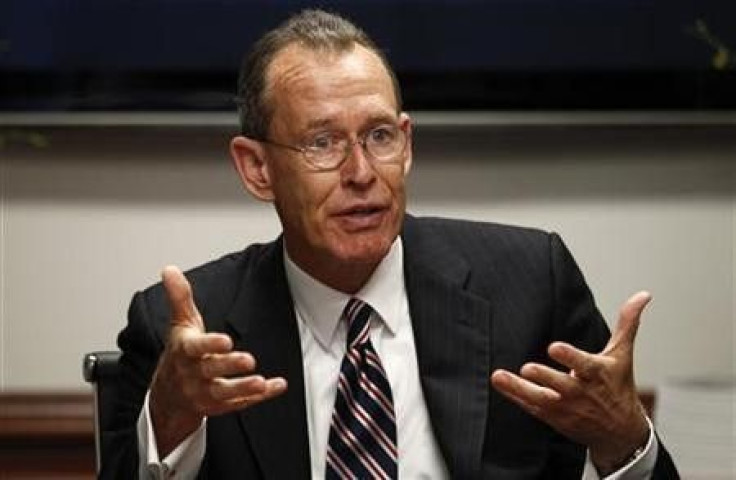Lockheed CEO eyes new F-16s for Taiwan

Granting Taiwan's politically sensitive request for new F-16 fighter aircraft would merely maintain the island's air power capabilities, not boost them, the chief executive of Lockheed Martin Corp (LMT.N), the plane's manufacturer, said on Tuesday.
This isn't an increase in Taiwan's ability to defend itself, Robert Stevens, Lockheed's chief executive, told the Reuters Aerospace and Defense Summit in Washington. These are replacement airplanes that are requested to assure that there's no degrading of the country's ability to defend itself.
Taiwan is seeking 66 late-model F-16 aircraft potentially valued at more than $8 billion to phase out its remaining F-5 fighters.
China strongly opposes U.S. arms sales to the self-ruled island which it deems an illegitimate breakaway province. The United States is committed under a 1979 law to supply Taiwan the arms it needs to maintain a sufficient self-defense capability.
The request for the new F-16s has been pending informally since 2006. Taiwan in 2009 also requested an upgrade to its 146 old F-16 A/B models. Then-President George H.W. Bush sold the first F-16s to Taiwan in 1992.
The issue of new F-16 C/D models is coming to a head partly because Lockheed Martin's F-16 production line may be drawing to an end, with a backlog of 58 planes as of the end of August.
Unless there are new orders from Taiwan, Iraq, Oman or another country, Lockheed Martin, the Pentagon's No. 1 supplier by sales, would have to start notifying suppliers within a few months that the last F-16 deliveries will come toward the end of 2013, Stevens said.
He said new F-16s for Taiwan did not represent an incremental request for more capability -- the kind of capability that some countries might object to.
They currently fly the F-16. They've flown the F-16 well and responsibly, he said. So a request for replacement airplanes in my judgment is consistent with the kind of requests our country has received from other countries who buy the F-16.
A total of 45 U.S. senators and 181 House of Representatives members have signed letters to President Barack Obama in recent months urging him to approve the sale. The senators, in a May 26 letter, cited concerns that Taiwan was losing the qualitative advantage in defensive arms that has long served as its primary military deterrent against China.
The administration is due by October 1 to say what, if anything, it plans to do to boost Taiwan's aging air force. The commitment was obtained by U.S. Sen. John Cornyn, a Republican from Texas, where Lockheed manufactures the F-16. In exchange, Cornyn lifted a hold he had placed on Obama's nomination of William Burns to the State Department's No. 2 job.
The administration has been weighing what it may view as a half-step designed to placate Beijing: a potential $4.5 billion retrofit of some or all of Taiwan's old F-16s that would include state-of-the-art radar systems built by either Northrop Grumman Corp (NOC.N) or Raytheon Co (RTN.N).
Stevens said he knew that the administration had not yet made a decision on the F-16s.
Asked whether a retrofit of the old models would suffice to maintain Taiwan's previous capabilities in the absence of new F-16s, he replied: I don't know the answer to that. I know the Taiwanese asked for 66 airplanes.
© Copyright Thomson Reuters 2024. All rights reserved.











